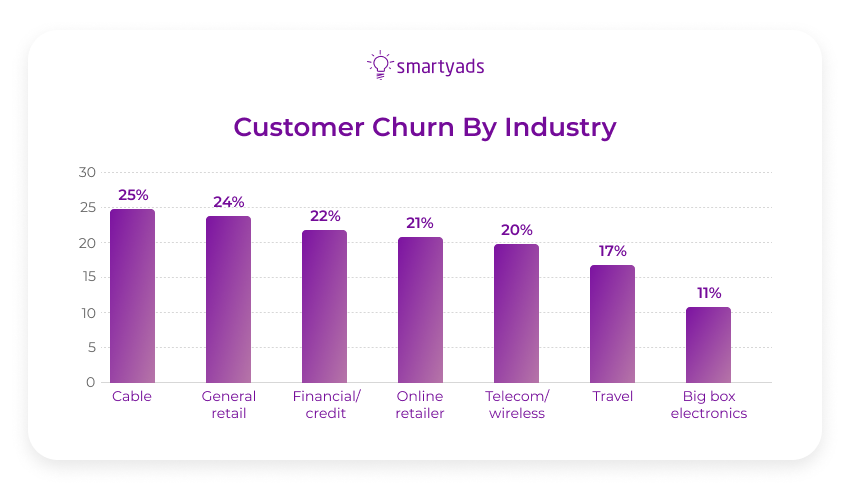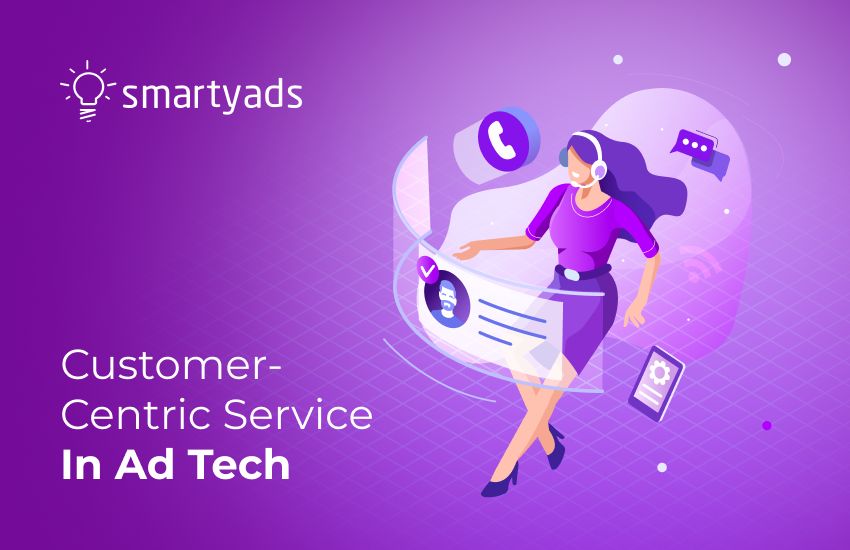Only a decade ago the ad tech scene was entirely ruled by a bunch of big market players, today it is largely saturated with thousands of technology providers. Previously, such providers could dictate the servicing rules; now, when the market is oversaturated, customers have endless opportunities to compare, choose and change vendors on the hunt for the best experience.
Now, the quality of service is just as important as the quality of advertising technology or the flexibility of pricing. People actively share their feedback on opinion desks and social media. Therefore, the key task of the ad tech business is to optimize the work of the servicing team, which cannot be imagined without qualified professionals and internal account management team practices.
So, how to build long-term relationships with customers? What is a customer-centered approach? Which customer care practices are valuable if you work in ad tech? Olga Selivanova, an experienced Lead of the Account Management team at SmartyAds (a global ad tech provider) is here to share her experience.

Why is customer care essential for any business?
Businesses around the world are trying to maintain a high level of customer service because it is a primary measure that helps to retain existing customers and attract new ones. By the way, it is common knowledge that attracting a new customer is 5 times more expensive than retaining an existing one. With the average customer churn rate going beyond 30% across global markets and industries, the significance of customer retention grew tremendously during 2021-2022.

By boosting customer service, a company also boosts customer satisfaction and encourages more purchases in the long run. Attentive customer service can play a central role in customer retention — and statistics only prove this.
It is worth pointing out that the main task of customer care is strategic and, in most cases, goes far beyond simple customer support. For example, in many ad tech companies, including ours, it is about building long-term relationships with partners. Of course, customer care professionals should also be well-versed in the technical area; however, technical skills today are only a part of the required competencies that customer care specialists should have.
The evolution of customer care is innate to the tech sphere. As IT and advertising technologies become available to everyone, they are not used only by a segment of narrow professionals (as was common over a decade ago). This requires both the simplification of software user interfaces and extending customer care beyond support. Providing explanations understandable to the users, and giving them advice on how to propel their businesses forward, are all tasks of the customer care professionals that make the hallmark of great service.
Major difficulties companies face with customer care
Imperfections of automation. The further machine learning and artificial intelligence penetrate all spheres of human life, the more often we hear that machines will replace people in the workplace. Someone expects the world without drivers; others predict the demise of professions like bookkeepers and travel agents. However, surprisingly, this will probably never happen with customer service.
Sure, today, correct routing of incoming calls without human intervention is possible with AI-powered assistants, and answering common questions is possible with chatbots. According to stats, over 85% of customer service interactions today are automated; however, 30% of consumers that can’t reach real humans during such interactions find this problem the most frustrating and rate it as a bad customer service experience.
For this reason, the scope of AI and ML applications for robust customer care is still limited, as customers may have non-standard questions or problems. In the B2B sector, where decision-making takes more time than in B2C, human interaction can also play a crucial role. For this reason, at SmartyAds, we focus on human interaction and growing meaningful business relationships.
Lack of expertise. Technical support representatives normally should have specific technical competencies; they are highly sought in IT companies or telecom. Customer care, meanwhile, is a bit different. Building a relationship with a customer is a long and multi-layered process. Customer care professionals should have excellent communication skills. Apart from this, they should advise customers on how to use the tech platform so that it brings the best possible business outcomes.
When new customer service professionals enter the ad tech industry, they are often scared by the abundance of terms and peculiarities they need to grasp. Additionally, processes and servicing cycles can be completely different in various ad tech companies — that’s why businesses often experience a shortage of qualified personnel. Our own experience shows that preparing customer care professionals based on the company’s own training programs and remote coaching can be the most rewarding. This way, shortly after coaching, the company gets a fully prepared specialist, specifically adapted to their work in their unique environment.

Why does the significance of customer care grow during the pandemic?
Interestingly, because of the pandemic, customers have become more demanding. For example, during the period of March 2020 - August 2021, companies saw a rise in processed support tickets — from 6% to 90%.

Remote collaboration tools, like Zoom or Google Meet, are becoming the new norm in the customer servicing process. In current circumstances, many customer support teams work remotely. These things pose additional challenges for companies, so response time stretches.
Worth pointing out that today customers expect the same level of service in B2B as they receive in B2C. This, first of all, applies to average response time and the number of channels through which clients can communicate with a brand.
B2B customers, just like B2C ones, prefer to communicate through applications, chats, and social networks. Some of them can contact the company through Facebook posts or even social media comments, which should not be overlooked. The old approaches and standards of communication no longer work. People want to receive a consultation or get their problem resolved as quickly as possible, and, for this, they often choose various channels of communication that are simple and efficient.
How to practice a customer-centric approach in ad tech: the SmartyAds experience
A customer-centric approach is the ability to determine the real needs of the customer and, on this basis, provide them with the most relevant and efficient service. This approach is a mandatory minimum for every company. Clear and timely assistance and guidance are very important, but it is no less significant to always do a bit more for your customers than they initially expect, which creates an added value that motivates and delights them to work with you for a long time.
A customer-centric approach is an alternative method of work. Unlike traditional approaches, it doesn't rely on universal practices of service but, rather, takes into account the individual portrait of the customer. This entails a lot of individual communication, individual consultations, and support.
For example, from the very beginning of communication with our partners, we at SmartyAds strive to build honest, trusting relationships based on openness and human touch. We also take into account the experience and characteristics of their businesses to understand their needs better. We assign an account manager to every client, in order to assist them at every touchpoint of their journey — from ad campaign set up to analytics and optimization. Solid relationships are the basis for our customer satisfaction strategy and the reason why advertisers keep choosing us as their vendor throughout the years. In over 10 years of work, our company developed 5 important principles of customer service:
- Put yourself in the client’s shoes. It is important for clients to achieve their goals, but they might lack essential knowledge or have a limited budget. At SmartyAds, we assign a dedicated Account Manager to every partner, free of charge and irrespective of their ad spend. The account manager helps partners make the most of the platform functionality, giving timely advice on how to adjust the campaign, optimize traffic and analyze achieved outcomes. Also, the account manager tracks and keeps all the important metrics under control. If performance or some metrics suddenly drop, account managers will immediately react and handle the problem until it is resolved and the right balance is achieved.
- Keep a history of interaction at hand. These days, communication with a client is more like a conversation with a friend — people can address you via chat, messenger, or email, depending on what’s convenient for them at any given moment. All the essential points of such interactions should always be stored in a CRM or other system that makes it easy to fetch information when necessary especially when the accounts are re-assigned to another member of the team or other specialists are involved in communication. Specialized software also helps you to personalize communication and keep track of the progress of how the client’s issue is being resolved.
- Go beyond support. When it comes to customer care, most tech companies focus on support and providing technical help. Sure, we think that this is important to help your customers understand how your product works and assist them with campaign setup and troubleshooting. However, it is also true that a customer care representative should display a genuine interest in the customer’s business and be proactive in offering additional advice that may positively affect the customer’s business outcomes.
- Measure customer satisfaction. Don’t go with the flow when it comes to customer satisfaction. If your customers don’t complain or seem to be okay with your product, it doesn’t mean that there is no room for improvement. Conduct polls, ask for feedback regarding separate features and overall service, launch loyalty programs, and invent how to accelerate and simplify customer servicing procedures.
- Employ empathy and willingness to delight. We believe that the little things are important in any relationship. The ability to do more for a customer than was expected is an opportunity to stand out in the competition. Little surprises can provide your customers with a feeling that they work with a real helper and friend; this is a feeling that they might possibly miss with other vendors. The question arises: how to find out exactly which “little things and delights” will hit the mark, and what really can be useful to the customer?
To wrap it up
Customer care is a very important part of customers’ interactions with the brand, which significantly affects their satisfaction with your service. Positive emotions that customers receive from interacting with the customer care team foster brand loyalty and contribute to long-term business relationships. This universal rule applies to all types of businesses; however, in our experience, for such complicated industries as ad tech, customer service can even become a critical point in decision-making.
Additionally, with increasingly growing competition, excellent customer care oftentimes appears to be the only thing those small businesses can employ in order to compete with giants. Therefore, the key task of every business these days is to invest in the customer care department — support and optimize it so that it could turn into the greatest strength and competitive advantage of the company.





![In-App Advertising: the Complete Guide [Updated 2025]](/storage/uploads/2020/september/in-app-advertising-trends.png)